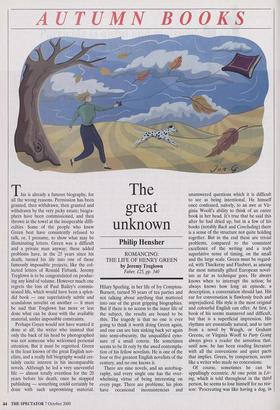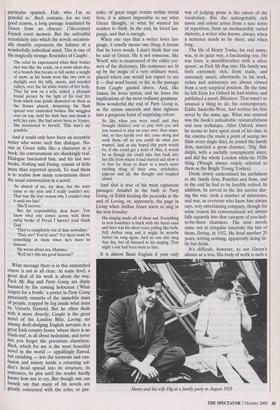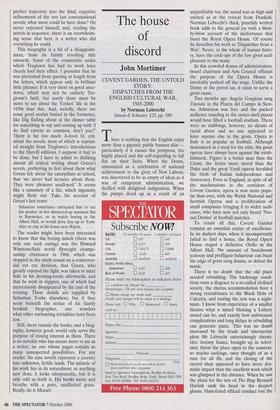'UMN BOOKS
The great unknown
Philip Hensher
ROMANCING: THE LIFE OF HENRY GREEN by Jeremy Treglown Faber, £25, pp. 340 This is already a famous biography, for all the wrong reasons. Permission has been granted, then withdrawn, then granted and withdrawn by the very picky estate; biogra- phers have been commissioned, and then thrown in the towel at the insuperable diffi- culties. Some of the people who knew Green best have consistently refused to talk, or, I presume, to show what may be illuminating letters. Green was a difficult and a private man anyway; these added problems have, in the 25 years since his death, turned his life into one of those famously impossible projects, like the col- lected letters of Ronald Firbank. Jeremy Treglown is to be congratulated on produc- ing any kind of volume. However much one regrets the loss of Paul Bailey's commis- sioned life, which would have been a splen- did book — one superlatively subtle and scandalous novelist on another — it must be said that Treglown has more or less done what can be done with the available material, under impossible constraints.
Perhaps Green would not have wanted it done at all; the writer who insisted that only the back of his head be photographed was not someone who welcomed personal attention. But it must be regretted. Green is the least known of the great English nov- elists, and a really full biography would cer- tainly excite interest in his incomparable novels. Although he led a very uneventful life — almost totally eventless for the 20 years before his death, once he stopped publishing — something could certainly be done with such unpromising material. Hilary Spurling, in her life of Ivy Compton- Burnett, turned 50 years of tea parties and not talking about anything that mattered into one of the great gripping biographies. But if there is no access to the inner life of the subject, the results are bound to be thin. The tragedy is that no one is ever going to think it worth doing Green again, and one can see him sinking back yet again into semi-obscurity, the unqualified cyno- sure of a small coterie. He sometimes seems to be lit only by the awed contempla- tion of his fellow novelists. He is one of the four or five greatest English novelists of the century, and no one knows it.
There are nine novels, and an autobiog- raphy, and every single one has the over- whelming virtue of being interesting on every page. There are problems; his plots have occasional inconsistencies and unanswered questions which it is difficult to see as being intentional. He himself once confessed, naïvely, to an awe at Vir- ginia Woolf s ability to think of an entire book in her head. It's true that he said this after he had dried up, but in a few of his books (notably Back and Concluding) there is a sense of the structure not quite holding together. But in the end these are trivial problems, compared to the consistent excellence of the writing and a truly superlative sense of timing, on the small and the large scale. Green must be regard- ed, with Thackeray and Flaubert, as among the most naturally gifted European novel- ists as far as technique goes. He always knows when to interrupt the action; he always knows how long an episode, a description, a conversation should last. His ear for conversation is flawlessly fresh and unprejudiced. His style is the most original and colourful English can offer. At first, a book of his seems mannered and difficult, but that is a superficial impression. His rhythms are essentially natural, and to turn from a novel by Waugh, or Graham Greene, or Virginia Woolf to Parry Going always gives a reader the sensation that, until now, he has been reading literature with all the conventions and quiet pacts that implies. Green, by comparison, seems like a writer who made no concessions.
Of course, sometimes he can be appallingly eccentric. At one point in Liv- ing, which is told throughout in the third person, he seems to lose himself for no rea- son: 'Procreating was like having a dog, in particular spaniels. Fido who I'm so grateful to.' Back contains, for no very good reason, a long passage translated by Green from an obscure 17th-century French court memoir. But the unfruitful eccentricity into which the novels occasion- ally stumble represents the failures of a wonderfully individual mind. This is one of the magically strange flourishes of Caught:
The relief he experienced when their bodies met was like the crack, on a snow silent day, of a branch that breaks to fall under a weight of snow, as his hands went like two owls in daylight over the hills, moors, and wooded valleys, over the fat white winter of her body. They lay now on a sofa, naked, a pleasant brutal picture by the light of his coal fire from which rose petals showered on them as the flames played, deepening the flush spread over contented bodies. She wriggled over on top, held his dark face and drank it with her eyes. She had never been to Venice. She murmured to herself, 'This man's my gondola.'
And it could only have been an eccentric writer who wrote such fine dialogue. No- one in Green talks like a character in a book; his conversations are shockingly real. Dialogue fascinated him, and his last two books, Nothing and Doting, consist of little more than reported speech. To read them is to realise how many conventions direct the usual conversation in a novel:
'So absurd of me, my dear, but the tears came to my eyes and I really couldn't see. That was the true reason why I couldn't stop it until too late!'
`She'll recover.'
'But the responsibility, dear heart. You know what one comes across with those awful books of Freud I haven't read thank God.'
'They're completely out of date nowadays.'
'They are? You're sure? Yet there must be something in them when he's been so famous.'
`He wrote about sex, Mamma.'
'Well isn't this sex good heavens?'
What message there is in this unmatched oeuvre is not at all clear. At some level, a great deal of his work is about the war; Pack My Bag and Party Going are dimly haunted by the coming holocaust ('What targets for a bomb,' a porter in Party Going presciently remarks of the immobile mass of people, trapped by fog inside what must be Victoria Station). But he often deals with it more directly; Caught is the great novel of the London Blitz. Loving, set among draft-dodging English servants in a great Irish country house 'where there is no black-out', is all about hedonism, and never lets you forget the privations elsewhere. Back, which for me is the most beautiful novel in the world — appallingly flawed, but ravishing — lets the torments and con- fusion and misery inside a returning sol- dier's head spread into its structure, its sentences, its plot, until the reader hardly knows how not to cry. But though one can loosely say that many of his novels are greatly concerned with the echo, or pre- echo, of great tragic events within trivial lives, it is almost impossible to say what Green thought, or what he wanted his readers to think. In the end, he loved lan- guage, and that is enough.
When one says that a writer loves lan- guage, it usually means one thing; it means that he loves words. I don't think that can be said of Green. He is not someone, like Woolf, who is enamoured of the odder cor- ners of the dictionary. His sentences are lit up by the magic of a very ordinary word, placed where one would not expect to see it — that word brutal, or fat, in the passage from Caught quoted above. And, like James, he loves syntax, and he loves the implications of the most ordinary grammar. How wonderful the end of Party Going is, as the syntax unravels and then tightens into a gorgeous burst of surprising colour:
So like when you were small and they brought children over to play with you and you wanted to play on your own; then some- one, as they hardly ever did, came along and took them off so you could do what you wanted. And as she hoped this party would be, if she could get a hold of Max, it would be as though she could take him back into her life from where it had started and show it to him for them to share in a much more exciting thing of their own, artichokes, pigeons and all, she thought and laughed aloud.
And that is true of his most rapturous passages: Amabel in the bath in Party Going, or Edith feeding the peacocks at the end of Loving, or, supremely, the page in Living when Arthur Jones starts to sing in the iron foundry:
His singing made all of them sad. Everything in iron foundries is black with the burnt sand and here was his silver voice yelling like bells. Still Arthur sang and it might be months before he sang again. And no one else sang that day, but all listened to his singing. That night a son had been born to him.
It is almost Basic English if your only way of judging prose is the extent of the vocabulary. But the unforgettably rich music and colour arises from a sure sense of repetition, from an inexhaustibly varied rhetoric, a writer who knows, always, when a sentence needs to be short, and when long.
The life of Henry Yorke, his real name, was, in its quiet way, a fascinating one. He was born 'a mouthbreather with a silver spoon', as Pack My Bag says. His family was both extremely rich, from trade, and extremely smart; afterwards, in his work, riches and aristocracy are always viewed from a very sceptical position. By the time he left Eton for Oxford he had written and published a novel, Blindness. That wasn't so unusual a thing to do; his contemporary, Eddie Sackville-West, had written his first novel by the same age. What was unusual was the book's unfaultable resourcefulness and sure technique. After Oxford, where he seems to have spent most of his time in the cinema (he made a point of seeing two films every single day), he joined the family firm, married a great charmer, 'Dig' Bid- dulph, with a usefully concupiscent sister, and did the whole London white-tie 1920s thing (Waugh always rudely referred to them as the Bright Young Yorkes).
Drink slowly undermined his usefulness to the family firm, Pontifex and Sons, and in the end he had to be forcibly retired. In addition, he served in the fire service dur- ing the war, took a number of mistresses, and was, as everyone who knew him always says, very entertaining company, though for some reason his conversational wit always falls squarely into that category of you-had- to-be-there charmers. The nine novels came out at irregular intervals; the last of them, Doting, in 1952. He lived another 20 years, writing nothing, apparently doing lit- tle but drink.
It's difficult, however, to see Green's silence as a loss. His body of work is such a Henry and his wife Dig at a family party in August 1928 perfect trajectory into the final, exquisite refinements of the two last conversational novels; what more could he have done? He never repeated himself, and, reading the novels in sequence, there is an overwhelm- ing sense that here is a writer who did everything he could.
This biography is a bit of a disappoint- ment, from its faintly revolting title onwards. Some of the constraints under which Treglown has had to work have clearly had their effect. I presume that he was prevented from quoting at length from the letters, which appear only in brilliant little phrases. It is very short on good anec- dotes, which may not be entirely Tre- glown's fault, but surely there must be more to say about the Yorkes' life in the 1930s than this. And, weirdly, there are some good stories buried in the footnotes, like Dig flailing about at the dinner table for something to say and coming up with 'I do find carrots so common, don't you?' There is far too much A-level lit. crit. about the novels, most of which is reprint- ed straight from Treglown's introductions to the Harvill editions. I suppose it had to be done, but I have to admit to disliking almost all critical writing about Green's novels, preferring to feel about them what Green felt about his caterpillars at school, that 'we never had lectures about them. They were pleasure unalloyed.' It seems like a summary of a life, which ingenuity might flesh out. Take his account of Green's last years:
Sebastian sometimes extricated him to sec his mother in her shuttered-up mansion flat in Bayswater, or to watch boxing in the Albert Hall, or would drive him up to York- shire to stay at his house near Ripon.
The reader might have been interested to know that the boxing match (there was only one such outing) was the Howard Winstone/Seki world flyweight champi- onship eliminator in 1968, which was stopped in the ninth round on a controver- sial cut eye decision, that Green, who greatly enjoyed the fight, was taken to meet Seki in his dressing-room afterwards, and that he went in slippers, one of which had mysteriously disappeared by the end of the evening. These details are supplied by Sebastian Yorke elsewhere, but if they seem beneath the notice of his faintly bookish biographer, one wonders what other enchanting trivialities have been lost.
Still, there remain the books, and a biog- raphy, however good, would only serve the purpose of raising interest in them. There is no novelist who has meant more to me as a writer, no one whose pages contain so many unsuspected possibilities. For any reader, his nine novels represent a journey into unknown, fertile lands. The miracle of his work lies in its naturalness; as anything new does, it looks idiosyncratic, but it is only odd as truth is. His books move and breathe with a pure, unaffected grace. Really, he is Mozart.




















































































 Previous page
Previous page